Catégories
Documents disponibles dans cette catégorie (144)
 Ajouter le résultat dans votre panier Affiner la recherche
Ajouter le résultat dans votre panier Affiner la recherche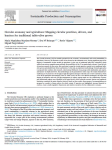
Article
The Circular Economy (CE) has notable potential for the economic, environmental, and social sustainability of agriculture. However, the literature on the CE has focused on the industrial sector, leaving significant gaps in the analysis of sustai[...]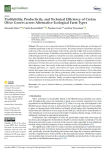
Article
Olive groves are an important element of the Mediterranean landscape and heritage and contribute significantly to the area’s rural economies. The primary interest of researchers and policymakers lies in the economic performance of this activity,[...]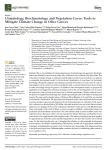
Article
A. Cano-Ortiz ; J.C. Fuentes ; F.L. Gea ; J.M. Ighbareyeh ; R.J. Quinto Canas ; C.I. Meireles ; M. Raposo ; C.J. Gomes ; G. Spampinato ; S. del Río González ; C.M. Musarella ; E. Cano |This work establishes the relationship between bioclimatology and agronomy. Bioclimatic indices are obtained for several areas under olive cultivation and correlated with olive yields. Due to the effect of climate change on cultivation and the h[...]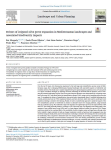
Article
R. Morgado ; P.F. Ribeiro ; J.L. Santos ; F. Rego ; P. Beja ; F. Moreira |Over the last 30 years, olive farming has experienced a fast and large-scale intensification process across its Mediterranean range, that is reshaping Mediterranean farmland landscapes with associated impacts on biodiversity and ecosystem servic[...]
Article
J.J. Cubillas ; M.I. Ramos ; J.M. Jurado ; F.R. Feito |Predictive systems are a crucial tool in management and decision-making in any productive sector. In the case of agriculture, it is especially interesting to have advance information on the profitability of a farm. In this sense, depending on th[...]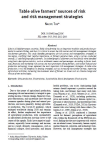
Article
Like in all Mediterranean countries, Table olive farming has an important tradition and production potential in western Turkey, and thus it is critical to assess the risk sources and risk management strategies that farmers perceive. This study i[...]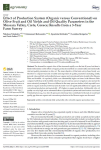
Article
The demand for organic olive oil has increased rapidly over the last 40 years, but there is limited information on the effects of organic production methods on commercially and nutritionally relevant quality parameters in olive oil. The main obj[...]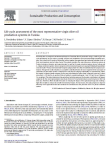
Article
This study aims to analyze the environmental impacts of Tunisian olive oil production using a “cradle to gate” Life Cycle Assessment (LCA) in order to quantify, compare and establish the most environmentally sustainable practices. This is the fi[...]
Article
R. Leogrande ; D. El Chami ; G. Fumarola ; M. Di Carolo ; G. Piegari ; M. Elefante ; D. Perrelli ; C. Dongiovanni |In agriculture, plant biostimulants have become necessary to meet the United Nations sustainable development goals (UN-SDGs) and advance the European Green Deal. In particular, seaweed-based biostimulants have received a greater acceptance for t[...]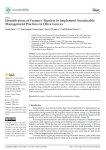
Article
Current European agriculture policies and strategies are aimed to boost the transition from the predominant conventional to a more environmentally friendly agriculture model. As part of this, it is crucial to identify the barriers that exist to [...]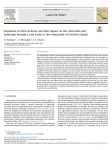
Article
The sustainability of farming systems has been enhanced by legislation on different scales, but at the same time these policies also promote more productive systems through farming intensification (e.g., use of irrigation or high tree densities)[...]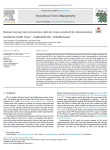
Article
This work was initiated in 2019 within the FAO WEPS project framework (2018–2022), aiming to determine the Water Productivity (WP) of the Tunisian olive orchards combining two scales of measurements for soil moisture determination: one for the g[...]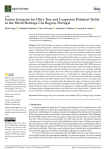
Article
H. Fraga ; N. Guimarães ; T.R. Freitas ; A.C. Malheiro ; J.A. Santos |In the World Heritage Côa region, in northern Portugal, agriculture has crucial economic, social and cultural importance. Vineyards and olive groves are part of the economic base of this region, contributing to the regional commercial budget and[...]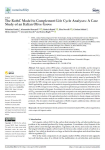
Article
V. Fantin ; A. Buscaroli ; P. Buttol ; E. Novelli ; C. Soldati ; D. Zannoni ; G. Zucchi ; S. Righi |Soil organic carbon (SOC) plays a fundamental role in soil health, and its storage in soil is an important element to mitigate climate change. How to include this factor in Life Cycle Assessment studies has been the object of several papers and [...]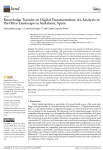
Article
Knowledge transfer on digital transformation: an analysis of the olive landscape in Andalusia, Spain
The global economy, and agriculture, in particular, faces significant challenges and transformation pressures. A major challenge, and opportunity, is the transformation towards digital agriculture or agriculture 4.0, where knowledge transfer (KT[...]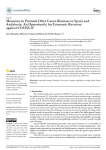
Article
Olive grove biomass presents an opportunity to reduce greenhouse gases and meet the sustainability objectives set by Europe. Given the relevance of this organic matter, this paper analyzes the evolution and current situation of the regulations t[...]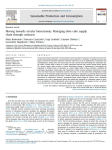
Article
M. Raimondo ; F. Caracciolo ; L. Cembalo ; G. Chinnici ; G. Pappalardo ; M. D'Amico |Circular bioeconomy represents a recent political vision expected to contribute in tackling the main challenges faced when sustainable industrial transition trajectories are to be implemented. Coordination and interdependence among actors are cr[...]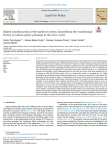
Article
Despite the growing importance of the digital transformation (DT) of the agrifood sector on the political agenda, traditional policies are not enough to provide proactive responses to rapid technological changes and new approaches for policy pla[...]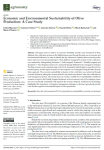
Article
G. Maesano ; G. Chinnici ; G. Falcone ; C. Bellia ; M. Raimondo ; M. D'Amico |This paper aims to achieve an economic feasibility and life cycle assessment of three different olive cultivation systems in the Mediterranean area through the joint use of economic and environmental indicators, in order to identify the key elem[...]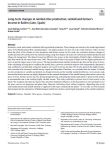
Article
Economic, social, and climatic conditions affect agricultural production. Those changes are relevant to the rainfed agricultural areas of the Mediterranean Belt, including Spain—the largest producer of olive oil in the world. However, little is [...]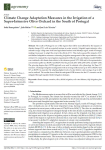
Article
The south of Portugal is one of the regions that will be most affected by the impacts of climate change (CC), with an expected increase in water scarcity. Irrigated super-intensive olive orchards occupy a large area of the used agricultural surf[...]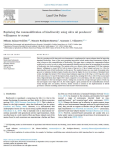
Article
There is a growing need for innovative new instruments to complement the current schemes aimed at improving farmland biodiversity. Some of the most promising innovations include market-based instruments relying on what is known as the commodific[...]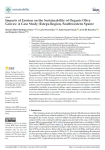
Article
Spain has more than 2.5 M ha of olive groves, with 60% of this area (i.e., 1.5 M ha) concentrated in the region of Andalusia (Southern Spain). Assuming the socio-ecological characteristics of these crops, of which their contribution to ecosystem[...]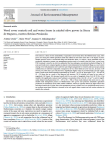
Article
Soil erosion is a threat for the sustainability of agriculture and severely affects the Mediterranean crops. Olive groves are among the rainfed agriculture lands that exhibit soil and water losses due to the impact of unsustainable practices suc[...]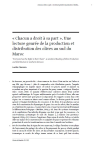
Article
La saison de récolte des olives fait naître une temporalité et un paysage qui façonnent les relations sociales et économiques. Ce moment d’effervescence collective autour d’une activité agricole emblématique de l’espace méditerranéen offre une p[...]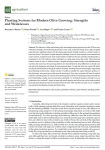
Article
The objective of fully mechanizing olive harvesting has been pursued since the 1970s to cope with labor shortages and increasing production costs. Only in the last twenty years, after adopting super-intensive planting systems and developing appr[...]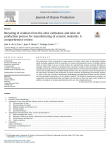
Article
The production of olive oil generates a huge amount of residues which must be adequately handled, which currently represents both an economic cost and an environmental concern. A possible solution which is under study is the use of such residues[...]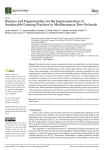
Article
J. Calatrava ; D. Martinez-Granados ; R. Zornoza ; M. Gonzalez-Rosado ; B. Lozano-Garcia ; M. Vega Zamora ; M.D. Gómez-López |This study identifies, through consultation with relevant stakeholders, low-input farming practices that can help to minimize the most pressing agronomic and environmental problems in some of the most relevant Mediterranean woody crops in Spain [...]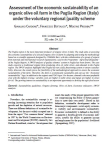
Article
Puglia region is the most important producer of organic olives in Italy. The study aims at assessing the economic sustainability of a selected organic olive oil farm by adopting and testing the methodology based on a scientific approach designed[...]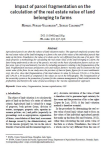
Article
Agricultural parcels are often the subject of land valuation studies. This approach implicitly assumes that the real estate value of the land belonging to a farm is the sum of the values of the individual parcels that make up the farm. Nonethele[...]









